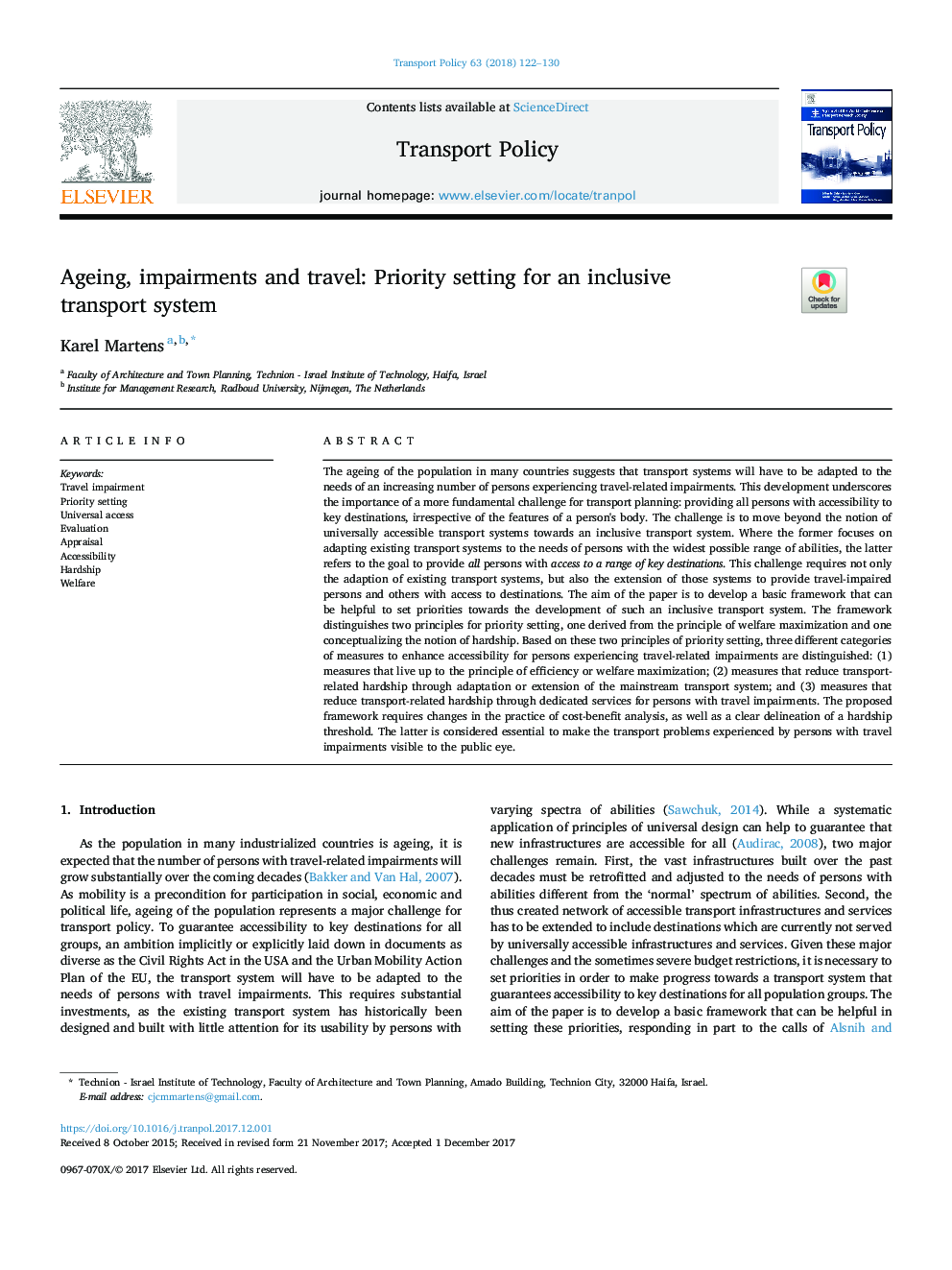| کد مقاله | کد نشریه | سال انتشار | مقاله انگلیسی | نسخه تمام متن |
|---|---|---|---|---|
| 7497204 | 1485814 | 2018 | 9 صفحه PDF | دانلود رایگان |
عنوان انگلیسی مقاله ISI
Ageing, impairments and travel: Priority setting for an inclusive transport system
ترجمه فارسی عنوان
پیری، اختلالات و سفر: تنظیم اولویت برای یک سیستم حمل و نقل فراگیر
دانلود مقاله + سفارش ترجمه
دانلود مقاله ISI انگلیسی
رایگان برای ایرانیان
کلمات کلیدی
اختلال در سفر، تعیین اولویت، دسترسی جهانی، ارزیابی، ارزیابی، دسترسی، سختی، رفاه،
ترجمه چکیده
پیری جمعیت در بسیاری از کشورها نشان می دهد که سیستم های حمل و نقل باید با نیازهای تعداد بیشتری از افراد مبتلا به اختلالات مربوط به مسافرت سازگار شوند. این پیشرفت اهمیت یک چالش اساسی را برای برنامه ریزی حمل و نقل را برجسته می کند: ارائه همه اشخاص به اهداف کلیدی، صرف نظر از ویژگی های بدن فرد. چالش این است که فراتر از مفهوم سیستم های حمل و نقل در دسترس جهانی به سوی یک سیستم حمل و نقل فراگیر بروید. در جایی که سابق بر تطبیق سیستم های حمل و نقل موجود با نیازهای افراد با طیف وسیعی از توانایی های بالقوه تمرکز می کند، دومی به هدف این است که همه اشخاص را به دسترسی به طیف وسیعی از اهداف کلیدی متصل کند. این چالش نیازمند نه تنها تطبیق سیستم های حمل و نقل موجود است، بلکه گسترش این سیستم ها برای ارائه افراد دارای معلولیت مسافرتی و دیگران با دسترسی به مقصد است. هدف مقاله این است که یک چارچوب اساسی ایجاد کنیم که می تواند برای تعیین اولویت ها در جهت توسعه چنین سیستم حمل و نقل فراگیر باشد. این چارچوب، دو اصل را برای تنظیم اولویت، یکی از مفهوم به حداکثر رساندن رفاه و یکی از مفاهیم مفهوم سختی را مشتق می کند. بر اساس این دو اصل از تنظیم اولویت، سه دسته مختلف از اقدامات برای افزایش دسترسی به افراد مبتلا به اختلالات مربوط به سفر مشخص می شود: (1) اقدامات که به اصل بهره وری و یا حداکثر رساندن رفاه؛ (2) اقداماتی که باعث کاهش مشکلات حمل و نقل از طریق انطباق یا گسترش سیستم حمل و نقل عمومی می شود؛ و (3) اقداماتی که باعث کاهش مشکلات حمل و نقل از طریق خدمات اختصاصی برای افراد مبتلا به اختلالات مسافرت می شود. چارچوب پیشنهادی نیاز به تغییر در عمل تجزیه و تحلیل هزینه-سود است و همچنین مشخص کردن آستانه آستانه سختی. این امر ضروری است تا مشکلات حمل و نقل افراد با اختلالات مسافرتی قابل مشاهده برای چشم عمومی باشد.
موضوعات مرتبط
علوم انسانی و اجتماعی
علوم اجتماعی
جغرافیا، برنامه ریزی و توسعه
چکیده انگلیسی
The ageing of the population in many countries suggests that transport systems will have to be adapted to the needs of an increasing number of persons experiencing travel-related impairments. This development underscores the importance of a more fundamental challenge for transport planning: providing all persons with accessibility to key destinations, irrespective of the features of a person's body. The challenge is to move beyond the notion of universally accessible transport systems towards an inclusive transport system. Where the former focuses on adapting existing transport systems to the needs of persons with the widest possible range of abilities, the latter refers to the goal to provide all persons with access to a range of key destinations. This challenge requires not only the adaption of existing transport systems, but also the extension of those systems to provide travel-impaired persons and others with access to destinations. The aim of the paper is to develop a basic framework that can be helpful to set priorities towards the development of such an inclusive transport system. The framework distinguishes two principles for priority setting, one derived from the principle of welfare maximization and one conceptualizing the notion of hardship. Based on these two principles of priority setting, three different categories of measures to enhance accessibility for persons experiencing travel-related impairments are distinguished: (1) measures that live up to the principle of efficiency or welfare maximization; (2) measures that reduce transport-related hardship through adaptation or extension of the mainstream transport system; and (3) measures that reduce transport-related hardship through dedicated services for persons with travel impairments. The proposed framework requires changes in the practice of cost-benefit analysis, as well as a clear delineation of a hardship threshold. The latter is considered essential to make the transport problems experienced by persons with travel impairments visible to the public eye.
ناشر
Database: Elsevier - ScienceDirect (ساینس دایرکت)
Journal: Transport Policy - Volume 63, April 2018, Pages 122-130
Journal: Transport Policy - Volume 63, April 2018, Pages 122-130
نویسندگان
Karel Martens,
